Building Safety and Resilience for Palestinian Refugees in Souf Camp, Jordan
Building Safety and Resilience for Palestinian Refugees in Souf Camp, Jordan
Block by Block partnered with UN-Habitat Jordan and the Department of Palestinian Affairs to transform a deteriorating park into a safe, accessible play space.
Building Safety and Resilience for Palestinian Refugees in Souf Camp, Jordan
Souf Camp, Jordan
Project types: Park Rehabilitation
Collaborators: UN-Habitat Jordan, Department of Palestinian Affairs, Al-Aqsa Sports Club
Region: Arab States
Tags: children and youth, accessibility, refugees and migrants, public health, social inclusion and human rights, social inclusion and human rights
Souf Camp in Jordan © UNRWA/ Nidal Ammouri
Background
Jordan has a long history of hosting refugee communities, with over 2.2 million registered Palestinian refugees calling the country home. Souf camp in Jordan's southern region is one of many refugee settlements characterized by vulnerable living conditions and inadequate green public spaces. These challenges became more evident during the COVID-19 pandemic, as restrictions highlighted the urgent need for easily accessible public spaces within the settlements for safe social interactions and improved access to basic services such as water and sanitation.
The existing park in Souf Camp had deteriorated significantly over time. Most playground equipment was broken, unsafe, and made of hazardous iron materials, with 80% of equipment deemed unusable. The ground lacked adequate sand fill, and low walls were causing accidents while unnecessarily dividing play areas. Perhaps most critically, there were no facilities, equipment, or ramps for children with special needs, making it difficult for them to play and interact with other children.
Building Safety and Resilience, Block by Block
In 2022, UN-Habitat's Global Public Space Programme collaborated with UN-Habitat Jordan and the Department of Palestinian Affairs to rehabilitate Souf Camp Park. The project aimed to make the space safer and more engaging for children and families while strengthening urban resilience and improving health outcomes for camp residents.
The Block by Block Methodology proved ideal for this sensitive context. After conducting a training session to equip the UN-Habitat Jordan team with Minecraft skills, the team organized a one-day workshop in August 2022. With support from the Department of Palestinian Affairs and the local Al-Aqsa Sport Club, they engaged 29 children from the local Palestinian refugee community, ranging in age from 6 to 13. The group included both girls and boys, and two participants with hearing and speaking disabilities were able to contribute their ideas alongside their peers—a testament to the accessibility of the Block by Block approach.



Progress
The implementation process brought the community's vision to life. Children planted seeds and seedlings throughout the park and took additional plants home to grow in their own spaces. The team installed protective fencing around the new plantings, while the children's enthusiastic participation demonstrated their deep investment in transforming their space.
Dangerous playground equipment was replaced with new, age-appropriate installations that could be used by children with special needs. Ramps and other accessibility features were added, hazardous low walls were removed, and seating was repaired and polished. The ground was properly prepared with adequate sand fill, and enhanced greenery transformed the park's appearance and environmental quality.



“Improving access to these facilities creates catalysts that strengthen urban resilience and improve the safety and health of those living in the camps.”


